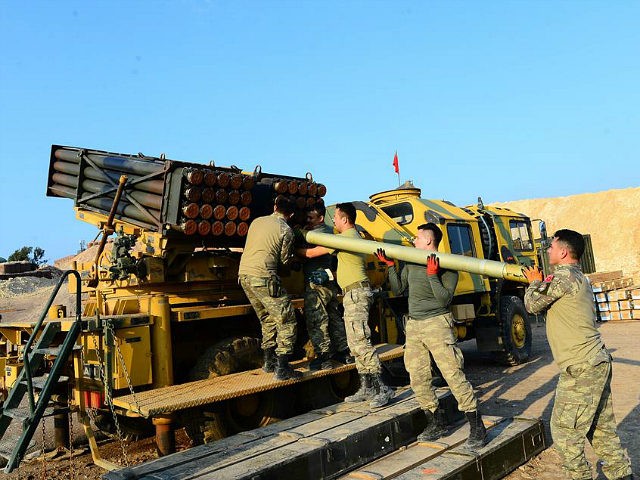Secretary of State Mike Pompeo announced on Monday the U.S. would impose sanctions on Turkey’s Presidency of Defense Industries (SSB) after it purchased Russian-made S-400 surface-to-air missiles, despite repeated U.S. objections and security concerns.
Pompeo highlighted America’s repeated objections to Turkey’s purchase of the missile systems from Rosoboronexport (ROE) — the Russian Federation’s main arms exporter — and further outlined the security concerns surrounding the purchase of Russian military equipment:
The United States made clear to Turkey at the highest levels and on numerous occasions that its purchase of the S-400 system would endanger the security of U.S. military technology and personnel and provide substantial funds to Russia’s defense sector, as well as Russian access to the Turkish armed forces and defense industry. Turkey nevertheless decided to move ahead with the procurement and testing of the S-400, despite the availability of alternative, NATO-interoperable systems to meet its defense requirements. This decision resulted in Turkey’s suspension and pending removal from the global F-35 Joint Strike Fighter partnership.
Turkish officials have openly addressed potential U.S. sanctions since at least May of 2019. Turkey signed the deal with Russia to acquire the S-400 system in 2017, over U.S. objections that the systems could not be integrated into the NATO arsenal and further, that the S-400 system was specifically designed to shoot down aircraft like the F-35 Lightning II. Hence, Turkey’s suspension from the program.
In November 2019, Turkey announced its intent to test two of the S-400 missile systems, which it received earlier that year, further pushing the U.S. towards sanctions.
In October 2020, Turkey used the S-400s in a test firing against British-made Banshee drones, stoking outrage from its NATO allies.
A State Department fact sheet fleshed out Pompeo’s announcement, detailing the sanctions on SSB, which include a ban on U.S. export licenses for goods going to the firm, a ban on loans or credits, a ban on U.S. Export-Import Bank assistance, a requirement that the U.S. oppose loans to SSB, and individual sanctions on SSB officials.
SSB is Turkey’s primary defense procurement entity. It’s president, Ismail Denir – who became the target of specific sanctions and visa restrictions, along with several other SSB executives – expressed defiance when addressing reporters Tuesday.
“The development of the domestic industry will continue, perhaps even faster. In a sense, this [sanctions] will be a flare and a warning,” Denir said, according to AA. “We expect this not to affect our relationships too much,” he added.
Pompeo, in his statement, expressed a similar desire to maintain U.S. relations with Turkey, but strongly asserted the S-400s remained a barrier.
“Turkey is a valued Ally and an important regional security partner for the United States, and we seek to continue our decades-long history of productive defense-sector cooperation by removing the obstacle of Turkey’s S-400 possession as soon as possible,” he said.
Turkey joined NATO in 1952, alongside Greece, and has been a member of the alliance ever since. Recent military agitation from Islamist President Recep Tayyip Erdogan has significantly strained relations between the Anatolian state and its ostensive allies.
Under Erdogan, Turkey has jumped headfirst into several international military excursions.
In 2019, Turkey invaded northern Syria, intervening in the years-long civil war.
In 2020, the Turkish military entered Libya to rescue the Government of National Accord (GNA), then in danger of falling to warlord Khalifa Haftar.
Erdogan has also stoked tensions with Greece over military activity in the Aegean Sea and extensively backed the Azeri government in its brief war with Armenia.
Turkey’s involvement in the latter conflict caused a substantial rift with Canada, another NATO member, in October, with Canada terminating military sales to Turkey over allegations that Canadian drone targeting equipment, sold Turkey, entered Azeri use in the Caucasian clash.

COMMENTS
Please let us know if you're having issues with commenting.